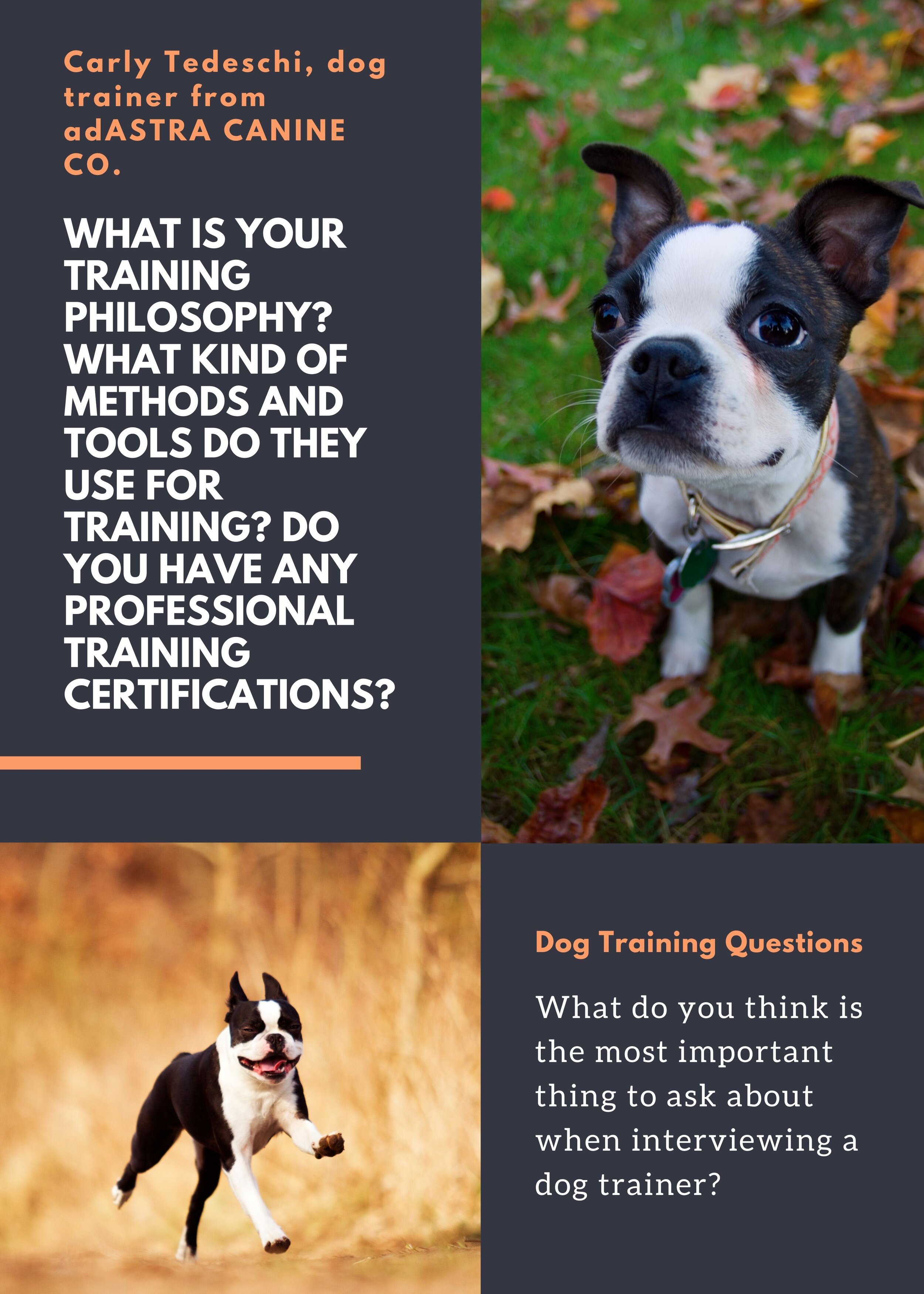It’s no secret that finding the right kind of dog trainer for your pup can be a daunting task. There are so many out there in an unregulated field that it’s hard to know which one to chose. Yup you read that right, the dog training field is completely unregulated. So we’re here to help you know what to look for in finding the right trainer.
What do they say about the way they train?
Before singing up with a trainer you want to look at their website and social media to see what they say about the way they train. You want clear statements about the kind of training methods they use. Look for dogs in flat collars, harnesses or martingales.
Ask questions
Ask the trainer about the methods they use and make sure you’re comfortable with their approach. Look for trainers who only use positive reinforcement and reward the dog for correct behavior and teaches the dog different behaviors in place of improper ones. Positive reinforcement is based on the science of animal learning and strengthens the bond you have with your dog. Ask them what happens if your dog gets it right? Ask what happens if your dog gets it wrong? How do you ensure that your dog is not inadvertently being punished? You want make sure that the trainer is not using positive punishment as a way to train your dog. Ask them about their mentors and who they look up to. Ask about what professional organizations they belong to.
Observe them
A good trainer will let you visit a class and interview them. You’ll get an in-person view of how they train dogs. If you are uncomfortable with what you see in person then it’s not the right trainer for you.
WHAT TO AVOID
You want to avoid anyone using aversives such as a prong collar, choke collar or shock collar (also known as an e-collar, buzz, tens collar, and many other names). These are all punishment based methods and only serve to suppress unwanted behavior and not correct it. You’ll also want to avoid trainers who talk about alpha, or dominance theories and trainers that say things like we use the tools to fit the dog. Those trainers go right for aversives and don’t train any other way. You also want to avoid any trainer who guarantees success. Don’t fall for it when trainers say these tools don’t hurt the dog, they absolutely do and science has shown this to be true.
Resources
Here are some sources to help guide you in your search for a force free trainer.
Pet Professional Guild
http://www.petprofessionalguild.com/
Pet Professional Accreditation Board
http://credentialingboard.com/Professionals
Academy for Dog Trainers
https://www.academyfordogtrainers.com/find-a-trainer
Helpful Terms
We know that there are many different types of dog trainers with different degrees/certifications so here are some helpful terms to ask about. But as a reminder these terms are only a guide and that you should speak with any dog trainer before employing their services.
Professional Canine Trainer - Accredited (PCT-A) certification for professionals who believe there is no place for shock, choke, prong, pain, force or fear in pet training and behavior practices. The Board also offers the only psychometrically sound examination for Training & Behavior Consultants who also support these humane and scientific practices.
Certified Dog Behavior Consultant (CDBC and Associate CDBC) are trainers who meet the requirements of the IAABC - International Association of Animal Behavior Consultants.
Certified Professional Dog Trainer - Knowledge Assessed & Skills Assessed (CPDT-KA/CPDT-KSA): Train with the Least Intrusive, Minimally Aversive (LIMA) training and behavior work.
Certified Applied Animal Behaviorist (CAAB) or Associate (ACAAB): A CAAB is a certified professional with scientific training in animal behavior. A CAAB works with people and their pets to modify pet behavior that has become a concern for owners. Our recommendation for a behaviorist is Dr. Terri Bright from MSPCA-Angell.
Veterinary Behaviorist (DACVB): The American College of Veterinary Behaviorists (ACVB) is the certifying board for veterinarians who are specialty trained to advance the behavioral health of animals through clinical practice, research, and science-based behavior education.




